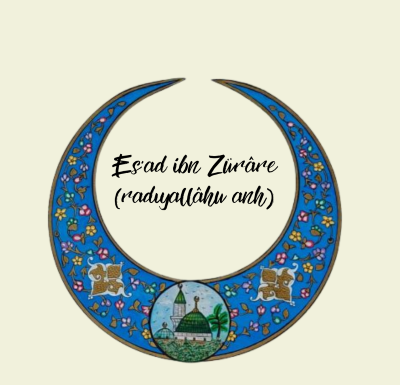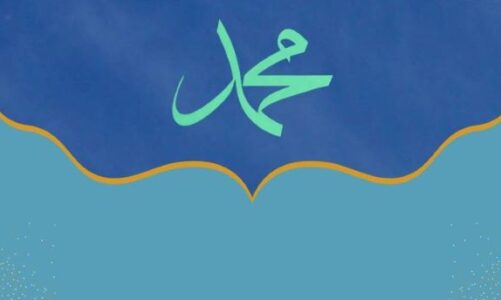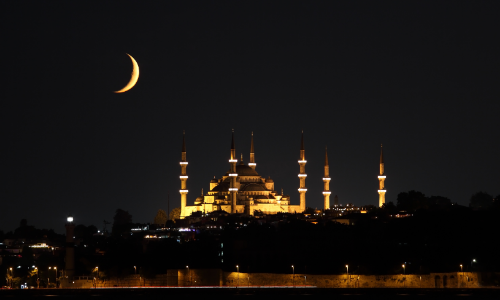Medina, known as Yathrib in those years, witnessed a bloody battle in 617 Hijri. The 120-year-long hostility between the Aws and Khazraj tribes led to the Battle of Bu’ath, resulting in hundreds of deaths on both sides. The majority of those who died in this battle, which ended with the defeat of the Khazraj tribe, were the elders and leaders of their people.[1]
The Honorable As’ad ibn Zurara, may God be pleased with him, then only 15 or 16 years old, grew up in a region plagued by years of warfare. As a member of the Khazraj tribe, As’ad was among those seeking allies for his tribe following their recent defeat. With this intention, he set out for Mecca with a group of young men, hoping to seek assistance from the Quraysh, known for their strength. They hoped that an alliance with them would prevent further attacks from the Aws tribe. However, Divine guidance was drawing them towards the Light in Mecca. Years later, the Honorable Aisha, may God be pleased with her, would interpret this event, saying, “Bu’ath was a day prepared by God for His Messenger.”[2]
The group was young, and they had chosen As’ad ibn Zurara as their leader. Despite being weary from battles and the scorching desert heat, As’ad pondered ways to establish peace and order. He did not wish to see another century marred by warfare. Perhaps, an alliance with the Meccan pagans would act as a deterrent, allowing songs of peace to resonate in Yathrib.
It was the pilgrimage season for the Arabs, a practice from the Jahiliyyah period that attracted many people from the surrounding areas. People from across the Arabian Peninsula and merchants from Medina had come to Mecca to trade in the markets set up there. Mecca was in a festive mood, bustling with visitors.
The markets were bustling with commerce. The previous year, the Prophet’s beloved wife, the Honorable Khadijah, and his protective uncle Abu Talib had passed away. The Pride of Humanity was offering allegiance in exchange for a blissful life on earth that would not compare to an hour of life in Paradise.[3]
While the Messenger of God was walking among the fairs in Mina, his gaze fell upon the group led by As’ad ibn Zurara. The Prophet approached them, introduced them to Islam, and offered them protection if they pledged their allegiance to him. The youths discussed among themselves; some were concerned that pledging allegiance would bring greater troubles upon them. During this, the group leader As’ad ibn Zurara was intently observing the Messenger of God. A whirlwind of emotions began to stir within him. The countenance of the Prophet conveyed much to him. He seemed oblivious to the discussions of his Companions as the truths of faith began to dawn upon his face. He stepped forward and grasped the blessed hand of the Prophet. With tear-filled eyes, he pledged his allegiance and turned to his Companions, saying, “Pledge your allegiance to this man whose face is marked by the truth.”[4] Moved by his actions and words, the remaining five young people immediately pledged their loyalty to the Prophet. A smile bloomed across the face of the Messenger of God.
The names of these six youths were As’ad ibn Zurara, Auf ibn Haris, Rafi ibn Malik, Uqba ibn Amir, Qutba ibn Amir, and Jabir ibn Abdullah ibn Riab, may God be pleased with them all.[5] Fethullah Gülen Hodjaefendi, in mentioning their names, says, “Wear these six names around your necks. You will not encounter any harm. For they embraced the light that descended upon the earth. They promised to shield it with their chests and walls.”[6]
The group from Khazraj, who had set out to form an alliance with the Quraysh, returned with the friendship of the Prophet Muhammad, peace and blessings be upon him. They gained two more treasures: the pleasure of God and Paradise.
The First Muslim of Medina
As’ad ibn Zurara had the honor of becoming the first Muslim of Medina. Under his leadership, there was no house in Medina left untouched by the message of Islam.[7] Soon, every street in Medina was abuzz with discussions about the Prophet. The moon had long risen over the hills of Wada, shining down upon Medina. Hearts were eagerly awaiting the blessed Prophet.
A year later, at a location known as Aqaba, including the five from the previous group, 12 individuals met with the beloved Prophet, peace and blessings be upon him.[8] This event, known as the “First Pledge of Aqaba” in the sources, saw As’ad expressing their yearning to learn more about Islam, having been away from the Prophet for a year, and requested a teacher be sent to them. The Messenger of God sent Mus’ab ibn Umayr, a young man who had memorized the Qur’an, to them.[9]
Medina’s First House of Knowledge: Dar al-As’ad
As’ad ibn Zurara opened his home to Islam, making it the equivalent of Dar al-Arqam in Mecca, now known as Dar al-As’ad in Medina. Mus’ab ibn Umayr, may God be pleased with him and As’ad ibn Zurara welcomed those newly acquainted with Islam in this house, teaching them the truth. This house became a center for laying the foundations of Islam in Medina.
With the conversion of Sa’d ibn Muadh, the leader of the Aws tribe and cousin of As’ad, the Aws tribe also embraced Islam, leaving only four houses in Medina untouched by Islam.[10]
A year later, in the 13th year of Prophethood, Aqaba had never been more joyous. At this location, led by As’ad ibn Zurara, 75 Muslims, including two women from Medina, had come to perform Hajj and visit the Messenger of God. The Prophet’s uncle, the Honorable Abbas, was also present, although we did not yet know of his conversion to Islam. Abbas was there to hear the pledges of the Medinans personally and to secure a promise of protection for his nephew. After reminding them of the potential dangers of taking the Prophet under their protection, Abbas asked if they were willing to accept.[11] However, the Muslims of Medina wanted to speak and interact directly with the Prophet. As’ad ibn Zurara took the lead: “O Messenger of God! Take from us the pledge you desire for yourself and stipulate whatever conditions you wish for your Lord.”[12]
The Prophet was overjoyed. He said, “My condition for you, on behalf of God, is that you worship none alongside Him, that you perform prayers, and pay the Zakat. For myself, the condition is that you testify to my Prophethood and protect me as you would your own families and women.”
From the crowd, a voice asked, “And what do we get in return for all this?”
The Trustworthy Prophet replied, “Paradise.”
Upon hearing these words, the Companions pledged their allegiance to the Prophet without hesitation.[13]
The Representative of Representatives
Before returning, the Messenger of God, peace and blessings be upon him, asked the group to select 12 representatives. The Muslims chose 12 representatives, nine from the Khazraj and three from the Aws. The Prophet appointed As’ad ibn Zurara as the chief of the representatives, making him the representative of all Muslims of Medina.[14]
The First Friday Prayer
As the number of Muslims in Medina increased, they chose a day to worship together, settling on Friday.[15] Muslims gathered at Dar al-As’ad to pray. As the Muslim community grew, As’ad ibn Zurara enclosed a palm grove with walls to construct a mosque, where the first Friday prayer was performed.[16]
The First Ansar to Pass Away
It was the first year of Hijrah. As’ad had only recently met the love of his heart, his beloved Prophet. While the construction of Masjid al-Nabawi was underway, he fell ill. This illness led to his departure to the Hereafter in the month of Shawwal. The Messenger of God, peace and blessings be upon him, personally attended the funeral arrangements and led the prayer for this glorious Companion.[17]
As’ad ibn Zurara played a significant role in spreading peace, justice, love, and brotherhood in Medina. God granted him the honor of being a pioneer even in death. As’ad ibn Zurara became the first Companion to be buried in Al-Baqi Cemetery.[18]
Let us remember As’ad ibn Zurara, who embraced Islam in his youth and carved a place in our minds with his valor, and the names of those present at the pledge of Aqaba with a prayerful intent. May God grant us the spirit of chivalry they possessed.
[1] Yücel Men, “Efendimiz (sas), Gençlerle Geleceğe Yürümüştür!”, www.peygamberyolu.com/Efendimiz-sas-genclerle-gelecege-yurumustur/
[2] Bukhari, Manaqibu’l-Ansar, 1, 27.
[3] Bediüzzaman Said Nursî, Sözler, İstanbul: Şahdamar Yayınları, 2014, p. 709.
[4] M. Fethullah Gülen, “Gönül Dünyamızdan-6”, 29 Haziran 1980, Yozgat.
[5] Ibn Hisham, As-Sirah, II, 70; Ibn Sa’d, Tabaqat, 1/217.
[6] M. Fethullah Gülen, “Gönül Dünyamızdan-6”, 29 Haziran 1980, Yozgat.
[7] M. Asım Köksal, İslam Tarihi, v. 5, İstanbul: Erkam Yayınları, 2016, pp. 140–145.
[8] Ibn Sa’d, At-Tabaqatu’l-Kubra, v. 1, p. 220.
[9] Ibn Hisham, As-Sirah, II, 84.
[10] Ibn Hisham, As-Sirah, II, 79; Ibn Kathir, Al-Bidaya, II, 176.
[11] Ibn Hisham, As-Sirah, II, 92; Tabari, II, 362; Ibn Sa’d, I, 189.
[12] Ibn Hisham, As-Sirah, II, 92; Ibn Sa’d, At-Tabaqat, III, 563; Köksal, II, pp. 268–269.
[13] Ibn Hisham, As-Sirah, II, 287.
[14] Balazuri, Ansab, I, 254.
[15] Bayhaqi, Dalail, III, 243.
[16] Ibn Hajar, Al-Isaba, Ibnu’l-Athir, Usdu’l-Ghaba, I, 86-87; Ibn Abdulbarr, Al-Isti’ab, I, 81; Ibn Hajar, Al-Isaba, I, 114.
[17] Ibn Sa’d, At-Tabaqat, III, 565; Ibn Abdulbarr, Al-Isti’ab, I, 81; Ibn Hajar, Al-Isaba, I, 114.
[18] Ibn Sa’d, At-Tabaqat, III, 565; Ibnu’l-Athir, Usdu’l-Ghaba, I, 86–87; Ibn Abdulbarr, Al-Isti’ab, I, 81; Ibn Hajar, Al-Isaba, I, 114.




